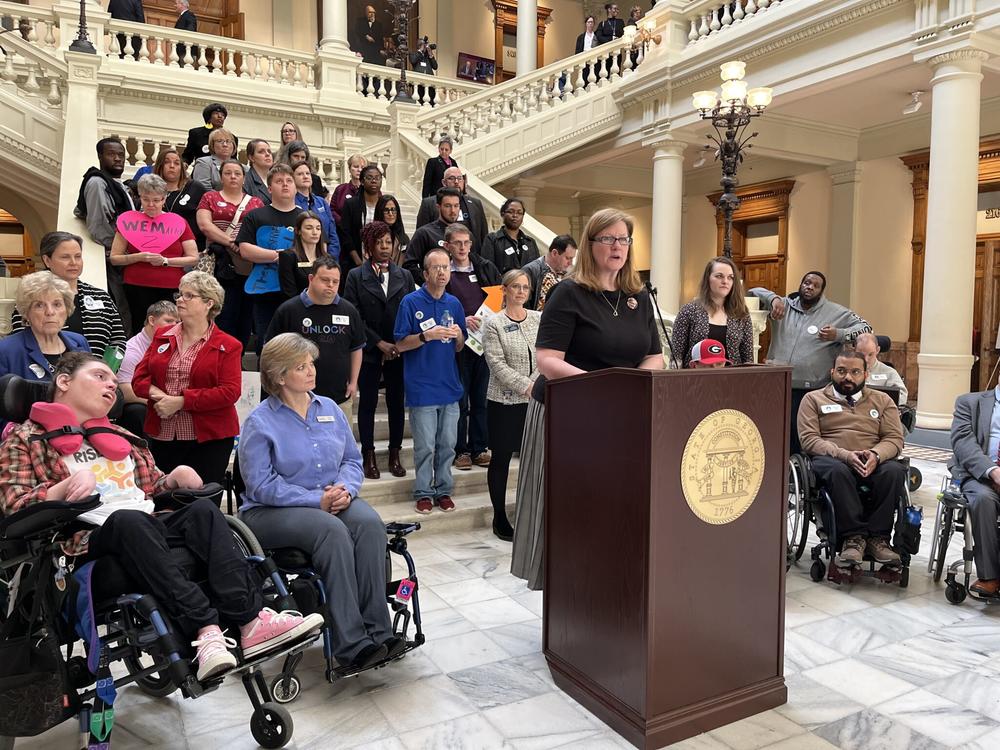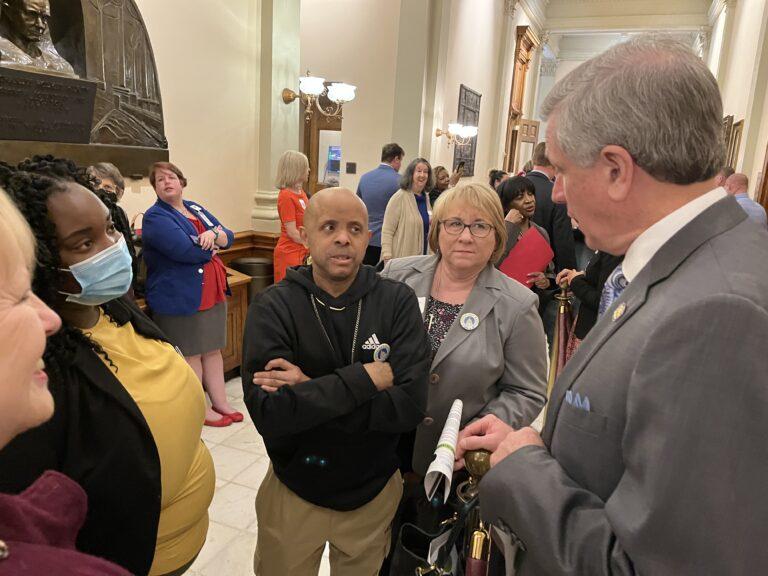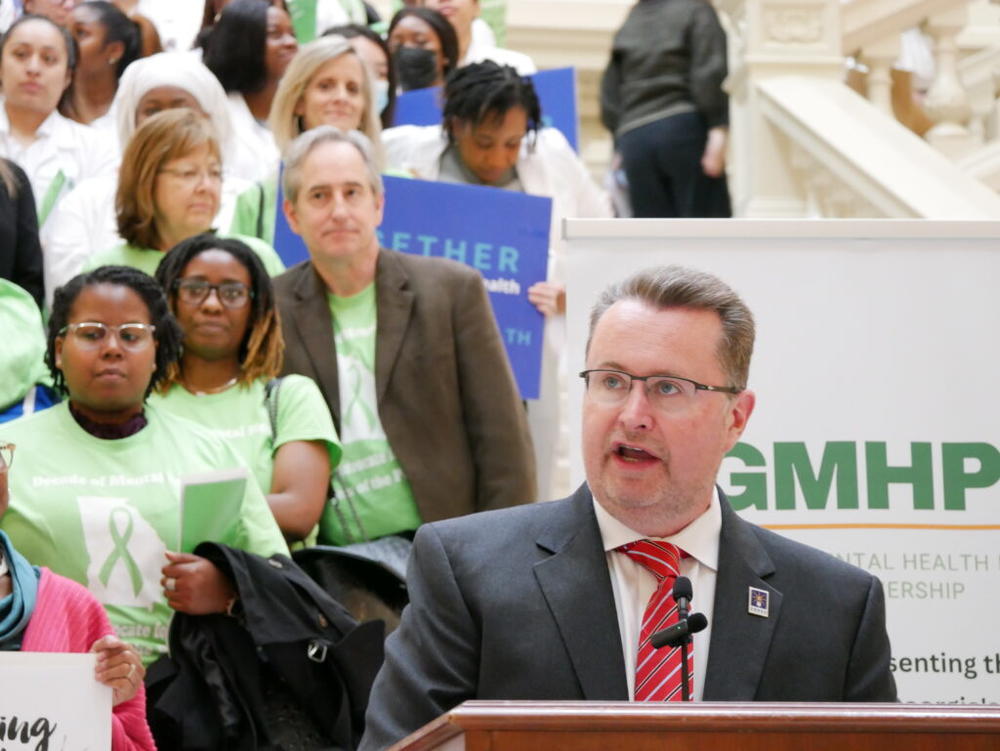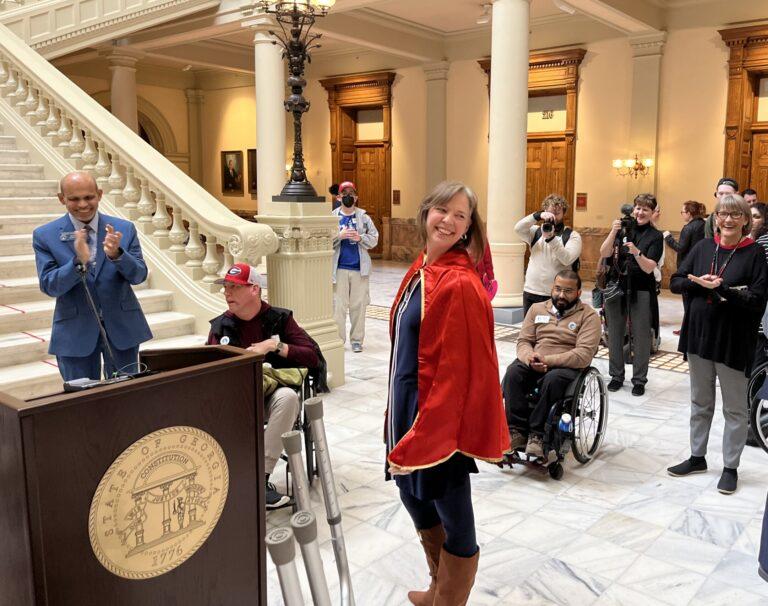
Caption
Lisa Newbern, whose son Griffin has Down Syndrome, says she worries about her son’s ability to obtain services when he becomes an adult.
Credit: Jill Nolin / Georgia Recorder

Lisa Newbern, whose son Griffin has Down Syndrome, says she worries about her son’s ability to obtain services when he becomes an adult.
Lisa Newbern dreads her son Griffin’s 18th birthday in three years, when he will no longer qualify for services for young people with disabilities.
Her son, who has Down Syndrome, will apply for government-funded services meant to keep people out of institutional settings. But Georgia’s pace of funding new slots has not left her feeling optimistic.
More than 7,000 people are already awaiting those services. The governor has proposed funding another 250 in next year’s budget, although that could change as lawmakers incorporate their own spending priorities.
A bipartisan Senate panel has proposed funding services for another 2,400 people next year.
“We have only been able to get a few 100 off that waiting list each year,” Newbern said at the state Capitol Thursday. “At such a slow rate, it could be more than 20 years before Griffin is eligible for the waiver. I don’t know any family that has that much time to wait for life-saving care, which is why we must end the waiting list now.”
But the Atlanta mom wasn’t at the Capitol advocating only for increased state funding to cover services for more people like her son — as advocates have long championed every year under the Gold Dome.
She was also there pushing for state lawmakers to increase the salaries of the caregivers who provide those services.

Tangeniqua Hopkins (left), a Fulton County direct-support professional, and Channing Bridges (center), who benefits from the county’s day programs, talk to Tyrone Republican Sen. Marty Harbin about the need to increase funding for both services and worker wages Thursday at the state Capitol.
The staffing shortage among workers who assist this vulnerable population has hamstrung efforts to shrink the waiting list in recent years even as state revenues have grown. Last year, lawmakers cautiously funded 513 slots for services through the Medicaid program.
And providers and advocates warn that a proposal to raise the hourly rate for direct-support professionals to $15.18, up from $10.63, will not be enough to fix the problem. They are pushing for state lawmakers to lift the rate to at least $18.86.
“You know that expression ‘bottom of the barrel?’ We are below the barrel. People cannot work for $10.63 an hour. It’s not life-sustaining,” said D’Arcy Robb, executive director of the Georgia Council on Developmental Disabilities. “$15.18? Yes, it’s a step. Yes, that would be positive. But really, for the long term to have a professional workforce, we are absolutely supportive of $18.86.”
Ryan Whitmire, president-elect of Georgia’s Service Providers Association for Developmental Disabilities, said the proposed nearly $5-per-hour increase will not make a dent in the workforce shortage.
“Wages and waivers are linked,” said Whitmire, who is also the president and CEO of Developmental Disabilities Ministries. “With an increase to a real-time adequate wage of $18.86, it will help providers be able to recruit and retain the staff needed to support current services, as well as support the people desperately needing services on the waiting list in Georgia.”
The state Department of Behavioral Health and Developmental Disabilities is still reviewing the results of a rate studythat recommended setting the rate at $15.18. The increase would cost the state about $91 million.
Kevin Tanner, commissioner of DBHDD, says the agency and provider network’s workforce is “in a state of emergency.”

Department of Behavior Health and Developmental Disabilities Commissioner Kevin Tanner.
“As a result of these challenges, we face the heartbreaking reality that Georgians who need this specialized care and support just simply cannot find it,” Tanner said Thursday.
To illustrate the downstream impact, Tanner said his agency worked to line up resources for 21 people with disabilities who were stuck at emergency rooms Wednesday for non-medical reasons.
Providers have also reported having to close facilities, turn people away and rely on overtime, with Whitmire saying he has a worker who is putting in an average of 80 hours a week.
“The rate problem is a crisis because providers cannot compete with fast-food places and other employers when we are funded for $10 an hour,” said Pam Walley, executive director of Athens-based provider Georgia Options.
Walley said her organization was about to bump up some worker rates to as high as $16, but still has a 40% open rate on shifts.
“I think it’s time for us to stop cutting corners and pinching pennies and expecting providers to figure out ways to get blood out of turnips,” she said. “Because people need a living wage.”

State Sen. Sally Harrell wears a superhero cape, which she said was a gift from an advocate for people with disabilities. “This is what it’s going to take as we go forward,” she said Thursday, Feb. 16, 2023.
A bipartisan Senate proposal would create a new commission that would pattern itself after the influential Behavioral Health Reform and Innovation Commission in the House, which was behind last year’s major mental health bill.
Sen. Sally Harrell, an Atlanta Democrat, and Sen. John Albers, a Roswell Republican, are the lead sponsors of the billfiled Wednesday. They were also the co-chairs of the study panel that examined the state’s waiting list.
“The study committee documented a system in crisis, a crisis too deep and complex to solve in one year,” Harrell said Thursday.
Georgia remains under a 2010 settlement agreement with the U.S. Department of Justice on treating those with developmental disabilities and is still monitored by an independent reviewer, who is expected to issue a new report soon.
Tanner, who took over as commissioner late last year, told lawmakers last month that exiting the settlement agreement is one of his priorities.
“My goal is to become the best state in the country to provide services. As we work toward that goal, the settlement agreement will take care of itself,” Tanner told reporters Thursday.
This story comes to GPB through a reporting partnership with Georgia Recorder.
Georgia Health Initiative is a non-partisan, private foundation advancing innovative ideas to help improve the health of Georgians. Learn more at georgiahealthinitiative.org